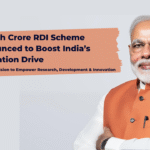Mumbai, November 2025
In a groundbreaking advancement for autonomous aerial technology, researchers at the Indian Institute of Technology (IIT) Bombay have developed a GPS-free control scheme that enables coordinated flight among drone swarms without relying on satellite navigation. This innovation represents a major leap forward in the field of robotics, defense, and disaster management.
About the Innovation
The newly developed system allows multiple drones to operate in sync using visual and communication-based coordination rather than GPS signals. By leveraging machine vision, onboard sensors, and artificial intelligence algorithms, the drones can maintain formation, avoid obstacles, and complete collective tasks autonomously.
This breakthrough eliminates the dependency on GPS, which is often unreliable in certain environments such as indoor spaces, dense urban regions, forests, or areas affected by signal jamming — making the technology valuable for a wide range of real-world applications.
Applications and Impact
The GPS-free control scheme opens new avenues in:
- Disaster management: Coordinated drone swarms can map affected areas, locate survivors, and deliver aid in GPS-denied regions.
- Defense and security: Enables autonomous surveillance and mission planning in areas where GPS signals may be intentionally blocked.
- Agriculture and infrastructure: Facilitates large-scale monitoring of crops, industrial zones, and infrastructure with precision and reliability.
By using local communication and vision-based navigation, the system ensures that drones can work together dynamically without centralized control — a feature inspired by natural swarms such as bees or birds.
IIT Bombay’s Role in Drone Research
IIT Bombay has been at the forefront of robotics and AI research in India. The development of this GPS-free swarm control model reflects the institute’s commitment to self-reliant technology and indigenous innovation, aligning with the national vision of Atmanirbhar Bharat in advanced technology sectors.
The research team has emphasized that such systems can significantly enhance the resilience and versatility of autonomous drones, making them capable of performing complex missions even in challenging or adversarial environments.
Disclaimer:
This article is based on official academic and institutional information and is intended solely for educational and informational purposes.







